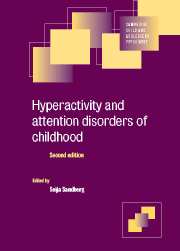Book contents
- Frontmatter
- Contents
- List of contributors
- Preface
- 1 Historical Development
- 2 Epidemiological aspects: what have we learned over the last decade?
- 3 Cross–cultural/ ethnic aspects of childhood hyperactivity
- 4 4 Sex differences and their significance
- 5 Classification issues
- 6 The role of attention
- 7 Cognitive aspects and learning
- 8 Developmental perspectives
- 9 Behavioural and molecular genetic studies
- 10 Biological underpinnings of ADHD
- 11 Psychosocial contributions
- 12 Institutional care as a risk factor for inattention/overactivity
- 13 Treatments: The case of the MTA study
- 14 Attention feficit hyperactivity disorder in adults
- Index
13 - Treatments: The case of the MTA study
Published online by Cambridge University Press: 28 August 2009
- Frontmatter
- Contents
- List of contributors
- Preface
- 1 Historical Development
- 2 Epidemiological aspects: what have we learned over the last decade?
- 3 Cross–cultural/ ethnic aspects of childhood hyperactivity
- 4 4 Sex differences and their significance
- 5 Classification issues
- 6 The role of attention
- 7 Cognitive aspects and learning
- 8 Developmental perspectives
- 9 Behavioural and molecular genetic studies
- 10 Biological underpinnings of ADHD
- 11 Psychosocial contributions
- 12 Institutional care as a risk factor for inattention/overactivity
- 13 Treatments: The case of the MTA study
- 14 Attention feficit hyperactivity disorder in adults
- Index
Summary
Attention deficit hyperactivity disorder (ADHD) occurs in 3–5% of school-aged children (Shaffer et al., 1996) and accounts for as many as 30–50% of child referrals to mental health services (Popper, 1988). Children meeting full (DSM-IV: American Psychiatric Association, 1994) criteria (early onset, 6-month duration and symptoms in more than one setting) have substantial impairment in peer, family and academic functioning (Hinshaw, 1992). Long-term outcome studies indicate that the syndrome persists into adulthood in most cases (Barkley et al., 1990; Mannuzza et al., 1993; Weiss and Hechtman, 1993), with increased risk for substance abuse and delinquency-related outcomes (Satter-field et al., 1987; Mannuzza et al., 1993). Although a very large literature (Pelham and Murphy, 1986; Swanson, 1993; Spencer et al., 1996; Hinshaw et al., 1998) has documented the beneficial effects of medication (principally stimulants), psychosocial treatments (principally behaviour therapy) and their combination, this body of research has suffered from significant limitations, including the brief duration of treatment (typically days to months), small sample sizes and reliance on a restricted range of outcome measures. Despite nearly 30 years of research on ADHD treatments, few controlled studies have examined the effectiveness of long-term treatments. Two recent exceptions (Hechtman and Abikoff, 1995; Gillberg et al., 1997) were of 1–2 years duration, and suggested that stimulant effects may persist when the stimulant is taken faithfully.
- Type
- Chapter
- Information
- Hyperactivity and Attention Disorders of Childhood , pp. 435 - 467Publisher: Cambridge University PressPrint publication year: 2002
- 1
- Cited by

